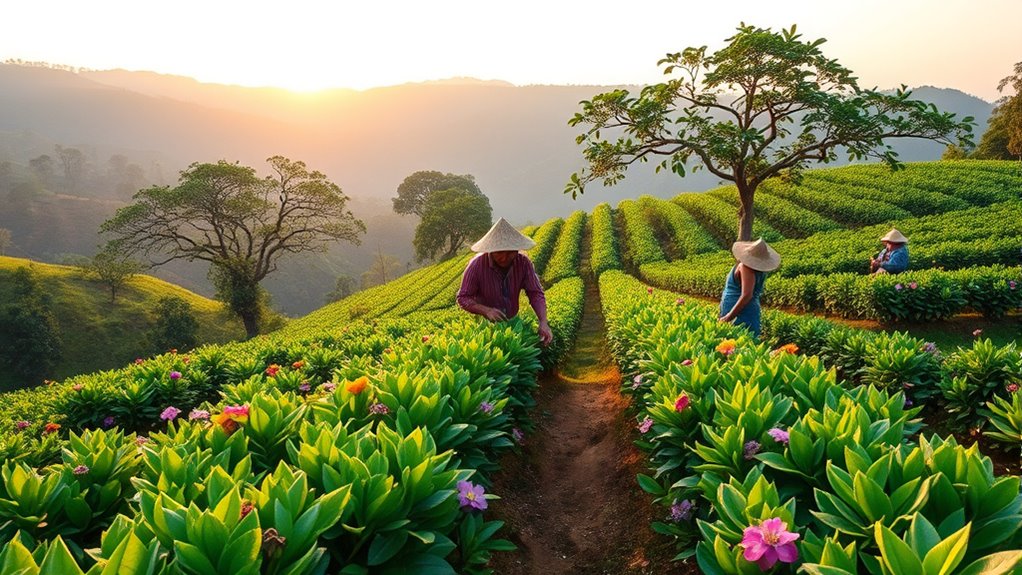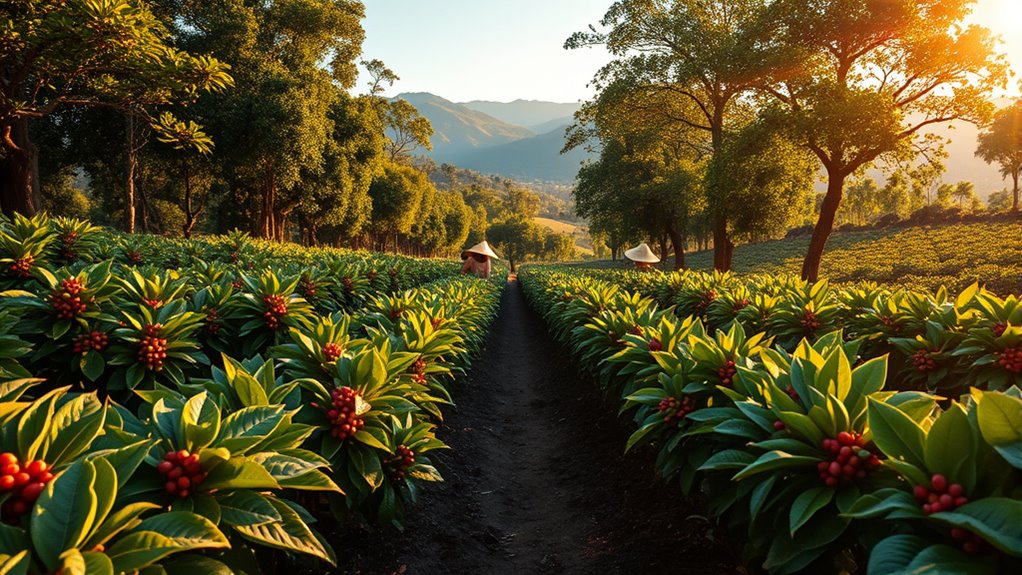Sustainable coffee farming emphasizes eco-friendly practices like shade-grown methods, organic cultivation, and water management, which help protect ecosystems, preserve biodiversity, and reduce chemical use. It also promotes fair labor standards, ensuring safe working conditions and fair wages for farmers. These practices boost coffee quality by developing richer flavors and supporting farm resilience against pests and climate impacts. Keep exploring to discover how these methods can positively impact both farmers and the environment.
Key Takeaways
- Shade-grown farming preserves ecosystems, supports biodiversity, and enhances soil health through canopy benefits.
- Organic practices reduce chemical use, promote natural pest control, and improve soil fertility.
- Certifications like fair trade ensure fair wages, safe working conditions, and community development.
- Agroforestry and crop rotation increase farm resilience against pests and climate impacts.
- Sustainable methods enhance coffee flavor and quality through microclimate regulation and careful processing.

Sustainable coffee farming offers a way to enjoy your favorite brew while protecting the environment and supporting fair labor practices. When you choose coffee produced through sustainable methods, you’re helping preserve ecosystems, promote fair wages, and reduce ecological footprints. These practices focus on creating a balance between coffee production and environmental health, ensuring that future generations can also enjoy quality coffee.
One key approach is shade-grown coffee, which is cultivated under a canopy of trees. This method preserves biodiversity by maintaining natural habitats for wildlife and insects. Shade-grown coffee trees benefit from the microclimate created by the canopy, resulting in slower bean maturation. This process often produces richer, more complex flavors, giving you a better-tasting cup. Plus, the trees improve soil fertility and prevent erosion, making farms more resilient to climate changes.
Shade-grown coffee supports biodiversity, enhances flavor, and improves farm resilience through natural canopy benefits.
Organic farming takes another route by avoiding synthetic pesticides and fertilizers. Instead, it relies on natural pest control methods, composting, and crop rotation to enrich the soil naturally. Organic practices reduce chemical runoff into nearby water sources and promote healthier ecosystems. When coffee is grown organically, it’s often certified as fair trade, which guarantees fair pay for farmers and promotes ethical labor standards.
This certification ensures workers have safe working conditions, fair wages, and access to community development projects. Water management is also critical in sustainable coffee farming. Farmers implement efficient irrigation systems, rainwater harvesting, and water recycling to conserve this precious resource. These techniques minimize water waste and protect local watershed health.
Additionally, integrating trees and shrubs into farms through agroforestry helps maintain soil stability and absorbs carbon dioxide, contributing to climate change mitigation. Farmers also combat pests and diseases naturally—using beneficial insects, crop rotation, and organic fungicides—reducing reliance on chemical controls. Employing mindset and confidence skills like innovation and resilience enables farmers to adapt to changing environmental conditions and market demands effectively.
Practices like composting create nutrient-rich soils that naturally resist pests and diseases, further reducing the need for harmful chemicals. These integrated pest management strategies promote farm health without compromising environmental integrity.
The flavor and quality of coffee benefit from these sustainable practices. Shade-grown coffee typically develops richer, more nuanced flavors because of the slower maturation process under moderated temperatures and humidity. Carefully selecting coffee varieties suited to sustainable environments and handling beans gently during post-harvest processing helps preserve these qualities.
As a result, sustainable coffee often offers a superior taste experience.
Frequently Asked Questions
How Do Shade-Grown Coffee Farms Impact Local Biodiversity?
You’ll notice that shade-grown coffee farms support local biodiversity considerably. They mimic natural forests, providing habitat for birds, insects, and mammals, including rare species.
These farms act as wildlife corridors, helping animals move safely between habitats. They also boost plant and pollinator diversity, which improves crop health.
What Are the Economic Benefits of Sustainable Coffee Farming?
Imagine you’re back in the Renaissance, discovering new markets. Sustainable coffee farming boosts your income through premium prices from certifications like Fair Trade and organic labels.
It helps you access niche markets, attract eco-conscious consumers, and build direct trade relationships.
Plus, you can diversify your income with intercrops, reduce costs with regenerative practices, and secure long-term stability by protecting soil health and gaining access to carbon credits, ensuring your farm’s future prosperity.
How Can Consumers Identify Truly Sustainable Coffee Brands?
To identify truly sustainable coffee brands, you should look for clear certifications like Fair Trade, Organic, or Rainforest Alliance on the packaging.
Check for transparency about their sourcing and farming practices, such as water conservation or shade-growing methods.
Research the company’s social impact and community support efforts.
Ultimately, brands committed to environmental, social, and economic sustainability will openly share these details, helping you make an informed choice.
What Role Does Water Conservation Play in Sustainable Coffee Farming?
Think of water conservation as the secret sauce in your coffee farm’s recipe. It plays an essential role by using techniques like drip irrigation and rainwater harvesting, which cut down water waste.
You can also implement mulching and moisture meters to optimize usage. These practices protect local water sources, improve crop resilience, and help guarantee your coffee is sustainable—making sure both your farm and the environment thrive for years to come.
Are There Certification Programs for Sustainable Coffee Practices?
Yes, there are certification programs for sustainable coffee practices. These programs, like UTZ, Rainforest Alliance, and 4C, set standards for environmental, social, and economic sustainability.
They require farms and companies to meet specific criteria through third-party audits. By obtaining these certifications, you show your commitment to responsible practices, improve your farm’s sustainability, and gain recognition that can attract eco-conscious consumers and support long-term viability.
Conclusion
By adopting sustainable practices, you can make a real difference in preserving the environment and supporting local communities. Imagine switching to shade-grown coffee, which protects wildlife and enhances bean quality. For example, a small farm in Colombia saw increased yields and happier ecosystems after implementing organic methods. Your choice to farm sustainably not only benefits the planet but also guarantees your coffee’s future. Start today, and be part of the solution for a greener, more resilient coffee industry.









